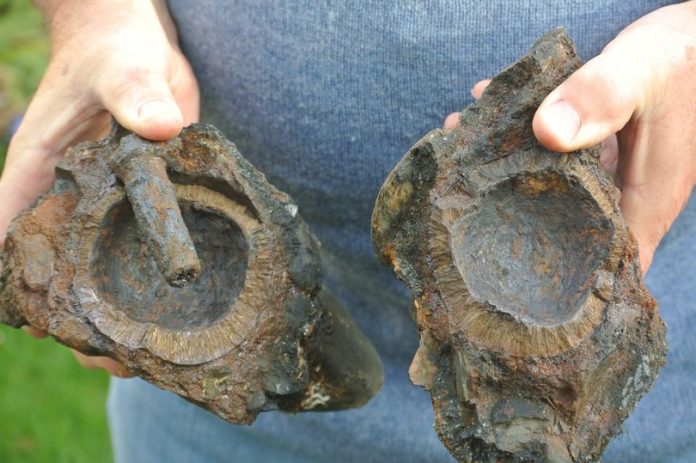The iron hand grenade was washed ashore from the remains of the former pirate ship Schiedam, which was wrecked off the coast of Cornwall in 1684.
The bomb disposal team have been called after a man found a second 17th century hand grenade washed up on a Cornish beach.
The iron ball was complete with a wooden bung and packed with the remains of gun powder. It had become encased in sand and pebbles, which adhere to iron objects, after more than 330 years on the sea bed.
The fascinating artefact comes from the wreck of the Schiedam, a former merchant ship captured by pirates and then into a store ship by the Royal Navy. The site of the wreck has been recently uncovered of sand by this year’s storms
Cornwall Live reported in November how a diver recently photographed cannons and other debris from the same wreck off Dollar Cove, a rocky beach next to Church Cove at Gunwalloe, near Helston.
Robert Felce, from Mullion, was delighted when he found the first grenade last year and was even more pleased to make another chance discovery in the same place last week.
He picked up the object from the beach and, breaking open the encrusting rock, revealed the primitive grenade, about the size of a cricket ball.
He said: “It is an interesting find as, at just over three inches in diameter, it is slightly smaller than the previous one but otherwise in good condition.
“It was found in a similar location to the previous one on the beach at Dollar Cove and encased in a rocky concretion of sand and larger pebbles. It was no doubt washed ashore from the wreck site following this autumn’s storms.
“Careful removal resulted in the recovery of the wooden bung, which would have been removed before the fuse was put in and lit.”
The remains come from a former Dutch merchant ship called the Schiedam. She was captured by Barbary pirates in 1683 and then seized by the British. The Schiedam was then used as a transport ship by the Royal Navy and was packed with arms and ammunition from a failed British colony in Morocco.
Split up from the convey returning home, she found herself trapped in Mount’s Bay and ran aground during a storm on April 4, 1684.
Mr Felce contacted the police who sent the navy’s bomb disposal team down to remove the black powder.
He said: “These are the earliest type of grenade used by British soldiers, who were selected for their strength and ability to throw them long distances. These men formed the forerunners of the British Grenadiers and their badge of identification still shows a similar grenade.”
He said find has also been flagged up to the Receiver of Wrecks, who will investigate and decide on ownership.
Mr Felce added that he was still waiting to hear who technically owns the first grenade he discovered. He added: “They haven’t decided yet on ownership but I hope they can be exhibited in a museum.”








